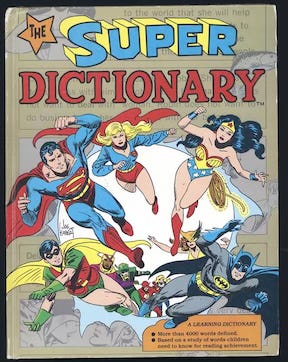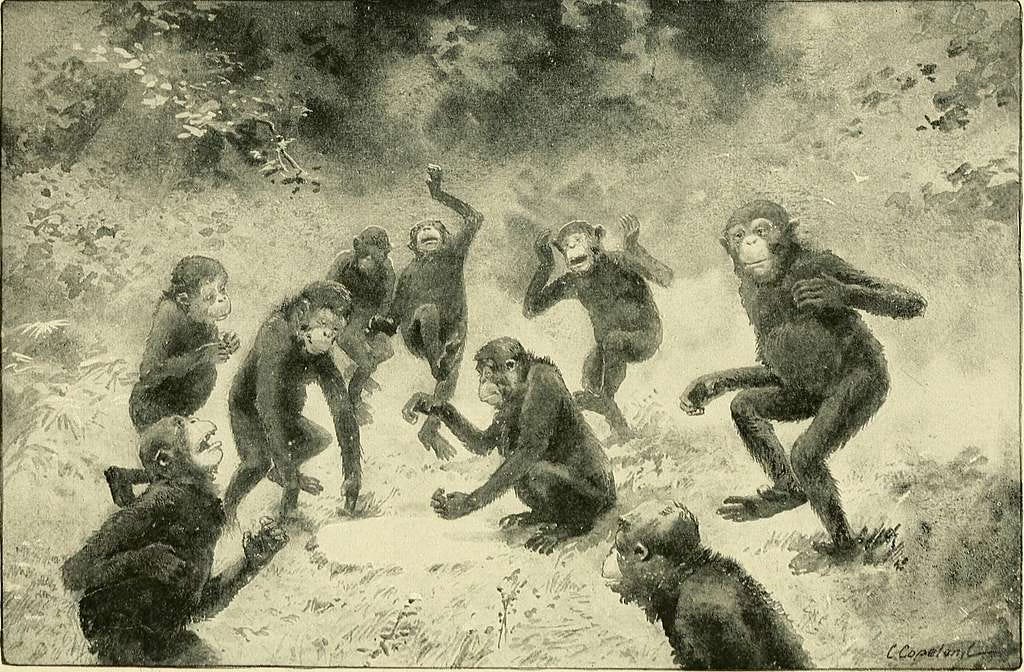Brawny Writing Bylaws
It's been a tough two days. Take a breath, take a break, and sharpen your writing skills with my 5+1 tips for good composition. I'm no Strunk & White, but then again, they aren't me. Enjoy!
Everyone loves a good list. Google is full of them.1 Writers are notorious for list making—and in a good way—when it comes to laying down basic principles of the craft. Given this tradition, I ask you “have the masses been clamoring for my erudite writerly wisdom?” I have no doubt that the collective the answer is “well, duh.” Hence, I cannot deny the assumed appeals from you, my vox populi. What follows, in no specific order, are five of my personal bylaws and knicker-knackers for smart composition, plus one additional tip. Each is a solid principle for every writer, be they Rhetoric 101 students or professional authors whose output can fill more than a few bookshelves.
Rule #1: Pull out semicolons like weeds.
A semicolon (;) connects two independent clauses that are closely related.2 Good usage example: These are my writing rules; I recommend all authors use them. Bad usage example: These are my writing rules; I am hankering for a tuna steak.
Writers, myself included, overuse semicolons in a first draft. That’s fine when you’re in the heat of creativity. You don’t want to stop to fix punctuation when you're blasting away at the keyboard. But semicolons are weeds in your prose that must be removed. Take a red pen, use it like a weed whacker, and rip those semicolons out of your word garden.
I limit semicolons to just one for every 5,000 words in a final draft (give or take). Better yet, I eliminate them all. Cutting semicolons makes sentences concise. The result is leaner, tighter, and more engaging prose.3

Rule #2: Do not, under any circumstances, use the adjective “amazing.”
There was a time when “amazing” was a delightful adjective. Entertainers, such as “The Amazing Le Pétomane,” displayed spellbinding gifts that enraptured audiences. Le Pétomane was a master virtuoso, well-deserving of that “amazing” qualifier time and again. Next, consider the hymn “Amazing Grace.” A case where the adjective is an absolute given. But otherwise, “amazing” is now overused to the point of meaninglessness. It’s what I call a “potato chip word.” Sure, it fills up the sentence. But it’s an empty calorie that provides no value. In what I consider a mass delusion of verbal nonsensicality, “amazing” has become the go-to word for describing just about anything.
Don’t believe me? Try this little exercise. Next time you watch one of those shows where celebrities give each other trophies for being celebrities, take a shot of your favorite adult beverage whenever that modifier spittles from the lips of a celebrity recipient. I promise, you’ll be dead of alcohol poisoning in just ten minutes.4
Here’s an example of such a speech given by the typical celebrity upon receiving an oversized trinket from another celebrity: “This is amazing! I’d like to thank my amazing costars and my amazing director. It was such an amazing project that it was my amazing honor to be a part of. And thanks to my amazing agent, my amazing manager, and most of all, my amazing third-and-counting husband and/or wife partner. You make my life so amazing. Thank you, all you amazing celebrities for this amazing honor. And thank you, you amazing suckers people in movie theaters everywhere who pay way too much scratch for tickets to sit through endless ads before the finally the overblown, self-important movie gets started who continue to support my work. Each and everyone of you is amazing.”
You get the idea. Now and forever, kill the “amazings.”
Rule #3: Use paperback or hardcover dictionaries and thesauruses.
Using computer software to check spelling or find an alternative word doesn’t help you. Yes, these digital tools do provide instantaneous answers. That’s useful in a pinch.
However, our brains are hardwired to retain information better when we read from paper. Software dictionaries, thesauruses, and their online equivalents provide you with lists of suggestions that make word replacement nothing more than an easy click of the mouse. It may help enliven the sentence. On the other hand, it may not. Don’t let software do the thinking for you when it comes to your work. It’s your name as the author. Grammarly won’t take a bullet for you.
When you look through a book for proper spelling or alternative words, you have to put in some effort. Your brain goes into full gear. Searching for words in a dictionary or thesaurus makes an enormous difference in your overall creative process. There will be lasting resonance rather than a simple suggestion that disappears into the ether after you’re done clicking.
Skip the digital and go for the hands-on. Your prose will thank you.

Rule #4: Warm up
Orchestras must tune up and play a few practice notes before ripping into the old Ludwig Van. Runners need to stretch muscles to prepare for a race. Actors have to wrap their arms around each other in pretentious group hugs before they give their all to the My Fair Lady prequel Pygmalion. In all cases, that warming up readies the player for a strong performance.
It’s the same with writers. Your first few paragraphs will be crap, but they’ll get you started. I call these opening paragraph warmups “the writer’s clearing of the throat.” You have to get all that stuff out of the way before your writing session kicks into high gear. Don’t lock yourself into a limit for your warmup. Sometimes that throat-clearing takes just a paragraph or two. Other times it will be a single sentence.
And there will be sessions when you need considerable time to get that throat cleared. Don’t be alarmed if you have to use a forest full of trees5 to get past the warmup stage. It took me 30+ pages before I finally got to the opening sentence of my book Bath Massacre: America’s First School Bombing. Grueling, yes. And in the long run, well worth the expenditure of time and words.
Rule #5: Don’t Start At The Beginning
When I taught college English, I encouraged my students to write out of order. Start with the conclusion. Write the introduction. Create the middle. Do this in whatever order works for you, but do it. Students often told me this offbeat method helped get their essays done right (and on time, which was a major relief to many of them).
Tackling the job out of order is how I wrote my book Swastika Nation: Fritz Kuhn and The Rise and Fall of the German-American Bund, the narrative nonfiction account of a late 1930s Nazi movement in the United States and the people who beat up those mopes.6 I looked at the book as an enormous jigsaw puzzle. All the pieces of the puzzle were there, like story, characters, plot points, timeline, and so forth. I knew where to start, the direction to go, and where that would ultimately lead me. What I didn’t know was how to get there. Writing all that in chronological order from start to finish made no sense.
There were times over the course of that intense writing year where I got stuck, and stuck bad. But I don’t believe in writer’s block. Besides, when you’re contracted for a book, you can’t afford to have writer’s block at all. Deadlines are deadlines. Missed deadlines turn into book cancelations and returned advances.
Thus, I wrote out of order. Scenes with Jewish mobsters staging raids on German-American Bund meetings were in the middle of the book, but were among the first scenes I wrote. The ending was written later in the process, even though I was not complete with the narrative. I wrote the pieces of my verbal jigsaw puzzle, looked them over, considered where they belonged, and reordered the prose into a compelling narrative thrust. When that task was done I could see the missing pieces of this metaphorical puzzle and what I needed to do to fill in the gaps.
I’m not saying you should always avoid writing in chronological order. Mixing it up, however, goes a long way to making your final manuscript engaging from Word-the-First to Word-the-Last.

One more thing
The pronouns“who” or “whom” are often confused. Here’s the technical answer. “Who" performs the action in the sentence. "Whom" is is on the receiving end.
I have an easier solution when it comes to any confusion over “who” versus “whom.” If it looks right to you, it probably is.

Story Links:
Joseph Pujol, AKA the Amazing Le Pétomane was a unique artist, known worldwide for his exquisite musical gifts. Consider his biography.7
This is not “amazing,” but it sure offers up some big laughs in a way that only a pretensious celebrity can when accepting a trophy from another pretentious celebrity while a roomful of pretentious celebrities look at the stage in awe and more than a little jealousy, while we, the unwashed mass of civilians, are saying “C’mon, man. Get over yourself. You didn’t cure cancer. You got some gold-plated doodad for playing the friggin’ Joker.”
The Jewish underworld was effective in taking out Nazi loyalists, using their unique means and methods to get the job done. Here’s an animated version of how mobster kingpin Meyer “Little Man” Lansky and his boys beat the living daylights out of those punks in the German-American Bund.
Share your writing advice or anything else in the comment section below. You know the drill.
Thanks for reading The Typewriter's Collage. Connect with me at Twitter/X, Bluesky, Threads, and Instagram at the handle @RealArnieB. I’m on LinkedIn and Facebookunder my real name. While you’re at it, click your mouse or trackpad over to my website, www.arniebernstein.com.
And because you made it this far, here’s your bonus content.
Ladies and gentlemen, boys and girls, lovers of refined culture everywhere, I give you, in an unfiltered performance, The Amazing Le Pétomane!
Here’s a joke: Q. How do you get away with a crime? A. Hide your evidence on the third page of a Google search. No one ever goes that far for an answer.
Semicolons also connect items in a list, but for the purposes of these rules, we’ll table that example.
This does not mean all sentences must be short. However, when you eliminate semicolons you won’t confuse the reader by linking clauses of varying lengths.
On second thought, it probably isn’t a good idea to take me up on that one.
i.e. “paper.” We, at The Typewriter’s Collage always use paper in our typewriters when composing first drafts.
Good elevator pitch, no?
And yes, Mel Brooks really did pay homage to this “amazing” performer in the 1974 movie Blazing Saddles via the character of Governor Le Pétomane. Maybe elsewhere in the movie as well, although I can’t remember what scene.




These photos and captions 🤣
I love this and will share these rules. Thank you Arnie.